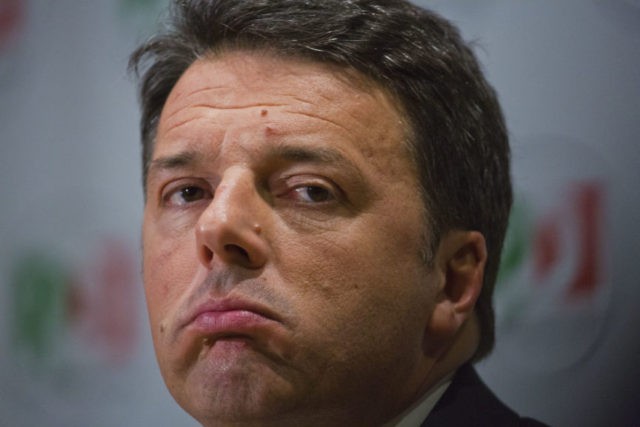ROME (AP) — Italian ex-Premier Matteo Renzi on Tuesday challenged members of his defeated Democrats to publicly declare if they’ll support the 5-Star Movement, throwing down the gauntlet as he tries to prevent his party from fracturing and backing its political nemesis.
Renzi took to Facebook after national election results showed his once-dominant Democratic Party had brought the center-left to its worst showing ever, with the coalition taking less than 23 percent of the vote.
The center-right coalition had 37 percent compared to 32 percent for the anti-establishment 5-Stars. Neither obtained enough seats to govern.
That outcome has kicked off what is expected to be weeks of horse-trading as each potential governing force tries to pick up support from elsewhere, including from disillusioned Democrats who might be tempted to back the 5-Stars.
“For me, the Democratic Party has to be where the people put us: in the opposition,” Renzi wrote. “If anyone from our party thinks otherwise, let him or her say so,” either in an upcoming party meeting or in Parliament.
Renzi drew criticism from within the Democrats when he announced Monday that he was delaying his resignation as party secretary until after a new government is formed. The delay was seen as a maneuver to stem any potential Democrats from jumping ship to back the 5-Stars, but critics also questioned Renzi’s motives and called it a “fake” resignation.
A clearly upset Renzi reminded his supporters that both the 5-Stars and the anti-immigrant League that now controls the center-right coalition have insulted the Democrats and “represent the opposite of our values.”
“They’re anti-European, anti-political and have used a language of hatred,” Renzi wrote. “They said we were corrupt, mafiosi, and that we have blood on our hands because of immigration. I don’t think they’ve changed their mind overnight.”
His stark warning suggested that the threat of Democratic defections to or support for the 5-Stars is very real.
The success of the 5-Stars, a grassroots internet-based movement that only was launched nine years ago, came in great part at the expense of the Democrats, including in their onetime stronghold of Emilia-Romagna in northern Italy.
Researchers at the Bologna-based Cattaneo Institute, analyzing data from a select number of cities, concluded that of the 2.6 million voters the Democrats lost since the 2013 general election, “relevant numbers” went to the 5-Stars, as well as to a lesser degree the League and a new left-wing party.
“All this indicates that the 5-Stars are the Democrats’ competitors, offering electors a ‘truer’ left than that embodied by a leader like Renzi,” the researchers said.
As a result, analysts say, Renzi has reason to worry about the rank-and-file’s intentions.
“I always start from the numbers. And the numbers tell me there are not many coalitions available,” said Roberto D’Alimonte, a political scientist at Rome’s LUISS University. “Today it looks very strange. But after a few weeks of useless searching, I think … it won’t look so strange.”
Paolo Magri, director of the ISPI think tank in Milan, said precisely because many of the 5-Stars’ new voters hailed previously from the Democratic Party, “a tie-up with the (Democrats) is more acceptable than with the League.”
“The 5-Star program is so malleable that it allows different readings,” he told The Associated Press. “The legitimate choice of the 5-Stars was to water down themes more crucial to the program so they would be appealing to both ends of the spectrum.”
The 5-Stars call themselves a grassroots “direct democracy” movement, with members voting for candidates and platforms via its online platform. The 5-Stars defy typical left-right ideology, espousing a platform that is green and anti-banks, and for the campaign, included a proposed monthly payment to Italians just for being citizens.
The 5-Stars have evolved since the last parliamentary election when they refused to deal with any party, and want to become “the new establishment,” D’Alimonte said.
“From anti-establishment to new establishment, and they want to gain credibility,” which they can do more effectively with the Democrats than with the extremists of the League, D’Alimonte said.
Indeed, while both the League and the 5-Stars often share the euroskeptic and populist monikers, such labels paper over their differences.
“The League is ideologically euroskeptical. The 5-Stars are tactically euroskeptical,” Magri said.
___
Colleen Barry contributed from Milan.

COMMENTS
Please let us know if you're having issues with commenting.